The moment that I knew graphic novel American Born Chinese was something special, and real, was in its second chapter. One of the main characters, Jin Wang, is a young, Chinese American boy who moved from an Asian neighbourhood in San Francisco to a white one in the suburbs. Jin has a horrible time adjusting. Mobile users, please note this article contains a lot of images.
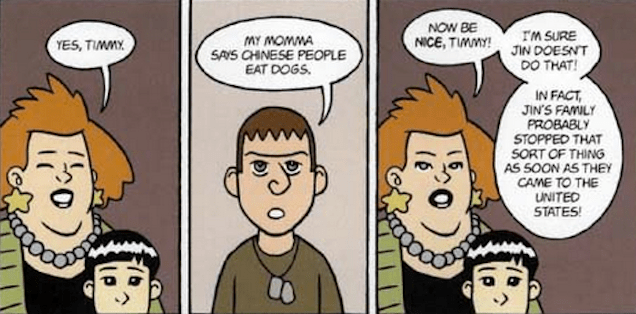
One of the kids expresses disgust at Jin’s dumpling lunch, and assumes that he eats dogs. The teacher butchers his name, and tells everyone he’s from China. He has no friends. And then another kid comes along — one who is even more outwardly Chinese in mannerisms and appearances than Jin. And Jin says something that really resonated with me:
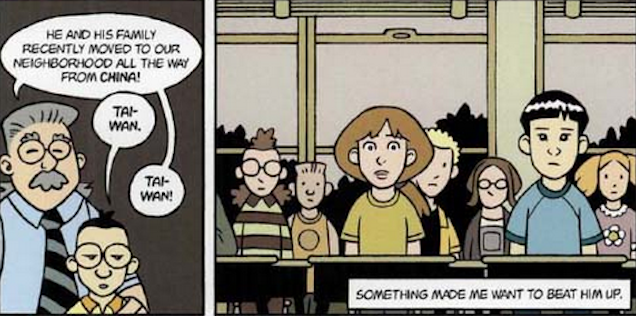
“Something made me want to beat him up.”
This debasing, of minority to minority, has appeared in the works of many minority artists. Invisible Man, by Ralph Ellison, opens with a scene of black college students fighting over coins in front of white benefactors. In The House on Mango Street, by Sandra Cisneros, a Latina girl who can pass for white looks down upon her fellow, darker Latina girls who cannot. Even on ABC sitcom Fresh Off The Boat, the Asian boy and black boy brawl in the lunchroom — two minorities fighting on the bottom rung of the social ladder.
American Born Chinese combines three stories of self-hate, moving towards self-discovery. The first is about Jin Wang. The second is about the Monkey King (based off the classical character from Journey To The West) who wants to be a God, and does everything in his power to make it a reality.
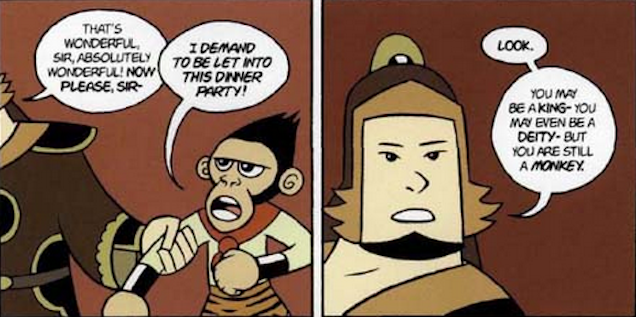
The third is the most uncomfortable — it’s about Chin-Kee (get it?) a walking, talking, hyperbolised Chinese stereotype. He’s unhygienic, mockingly accented, bucktoothed, and perverted towards girls. It’s a nightmare — it’s every playground insult come to life, and every latent fear that Asian men hope they don’t fulfil. “Asian American men who are older than me,” Yang says, “Will tell me that the Cousin Chin-Kee character was so painful that it was hard for them to finish the book.”
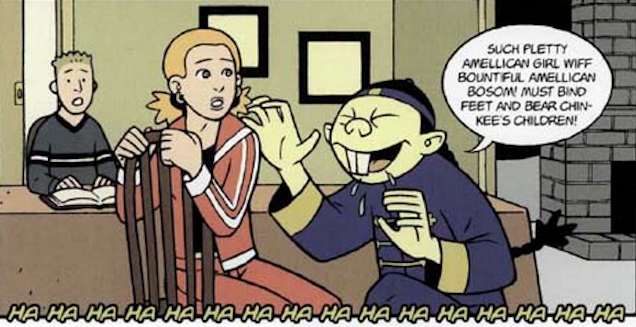
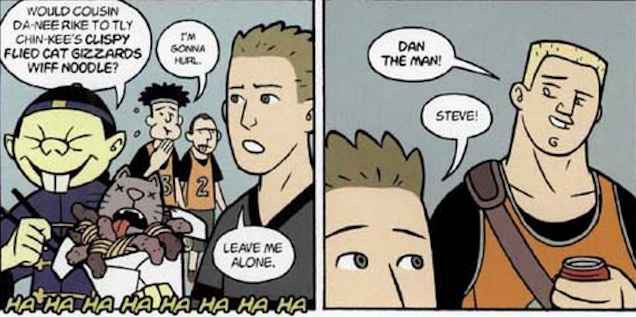
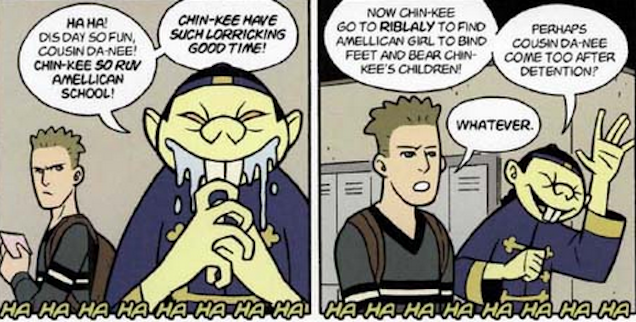
There are many moments in American Born Chinese where characters are made to feel embarrassed for what they are. The Monkey King, after being told by the Gods that he will never be more than a monkey, notices the smell of monkey fur when he goes back home — it was a smell he had never noticed before.
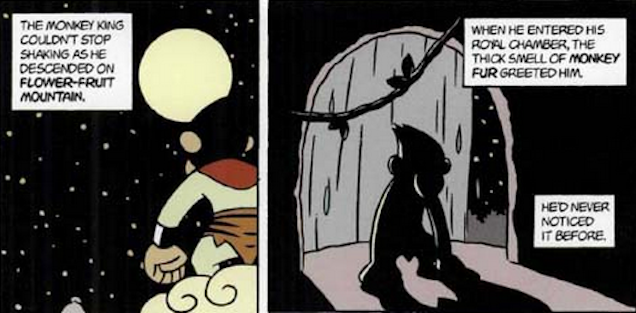
There’s another moment in the novel when Jin and his friends are having a good time, when the two class bullies come along using racial epithets. Rather than getting angry, they turn red with embarrassment, and sit in silence. Their good time has been ruined, and they have been made crushingly aware of their social status.
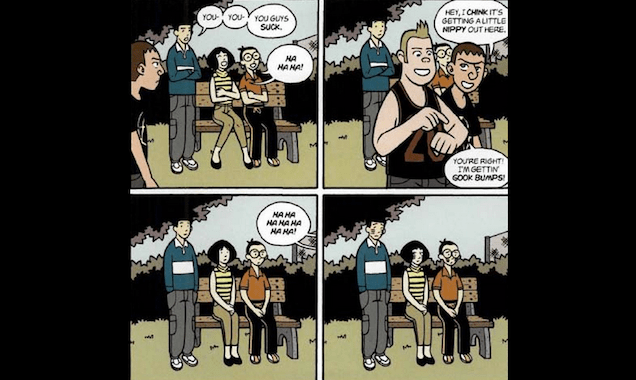
Countee Cullen’s poem “Incident” may have captured this humiliation best — of the way that aggressive, nasty comments can cut to the heart of a person’s insecurities:
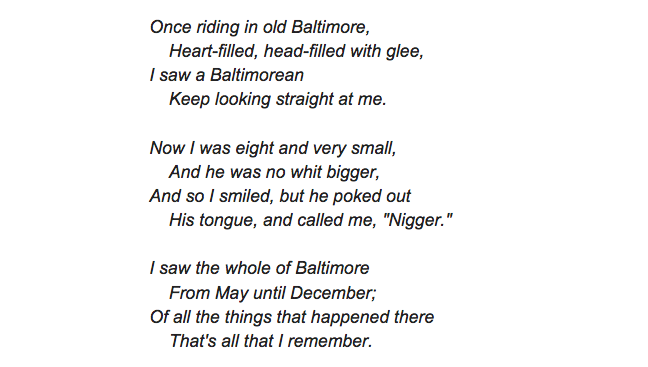
The graphic novel also explores interracial relationships, both platonic and romantic. Jin falls in love with a white girl in his class named Amelia, and to impress her, he starts curling his hair, to match the hairstyle of the other boys in their class. It’s a subtle but notable subsuming of his Asian identity, and he is mocked for it — more so than if he simply kept his hair the way it was before.
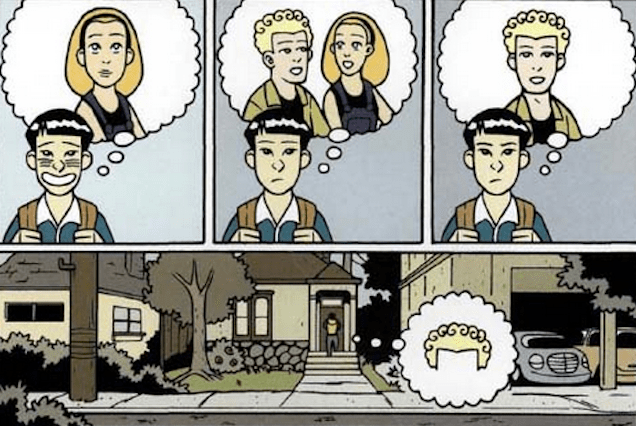
The bullies affect Jin and wound his pride, but it’s one of his good friends, Greg, who cuts the deepest, and challenges his Asian manhood. In a racially coded, awkward conversation, Greg tells Jin that he doesn’t want him to date Amelia — that since they are all getting older, Amelia needs to be aware of the type of people she hangs out with.
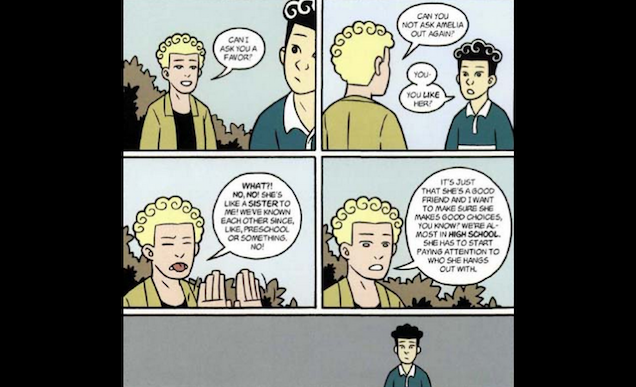
It hurts horribly, especially because it was Greg who defended Jin from his racist bullies. But even Greg’s tolerance has a limit — racism comes in multitudes, and isn’t limited to epithets and slanting eyes. It’s the moment that sparks Jin’s total denial of self and Asian-ness. He no longer wants to act white; he wants to be white. And it’s a desperate wish that he pays for dearly.
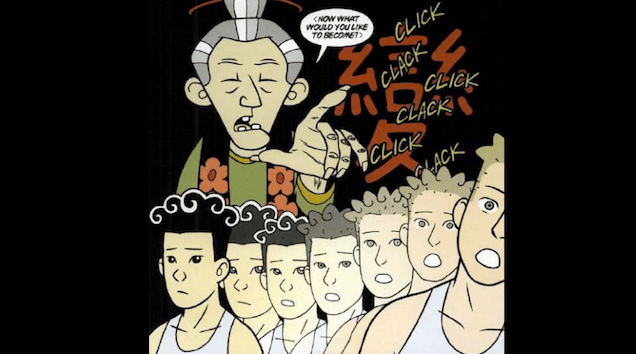
It’s one of the most guilty thoughts that an ethnic minority can have — a wish to fit in and look different — to not bear the baggage that comes with one’s physical identity. And it’s not something that’s talked about much. But it ought to be something that’s talked about more, if only because talking about it helps us come to term with it. And all communication, from writing, to drawing, to film, to speech, is the first step.
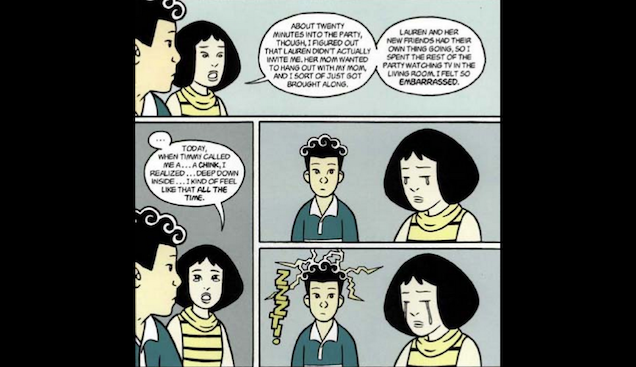
Self-hatred is a complicated emotion that I’ve experienced first hand. For a couple of years, my sister and I were two of the only Chinese kids in our public school, amongst a sea of white faces. But there was another kid in my school who was more ‘Asian’ than I was. His mum made his clothes for him. He didn’t speak English at home. And our families were friends — our mums told us that we needed to stick together. So we did so — but only to an extent.
One day, he brought in some of his mum’s home-made sushi. The kids around him all turned up their noses, making a big show of how disgusting it was. I really liked sushi, but to my shame, I joined in making fun of him. It was a misguided need to belong, but it was also a self-hatred of my Asian identity — it felt good to kick someone who was more Asian than I was, and to reject a label that I was always conscious of.
There was also a feeling of theatre to the whole thing — that I was performing at being Chinese in front of a white audience. I partook in Asian things that might amuse Fthem, like teaching them how to swear in Chinese, or pretending that I knew kung fu (it didn’t take much more than a few kicks to convince them of this). And, I would disavow the ‘other’ Asian things, like sushi, that would gross them out or alienate them from me.
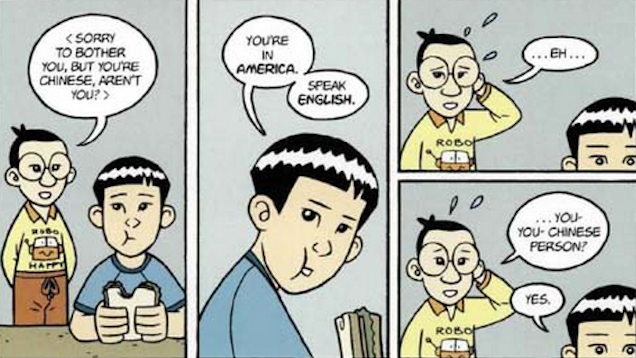
When I spoke to Gene Luen Yang, the author and artist of American Born Chinese, over email last week, he reflected about this self-hatred. Much of the novel was inspired by his own childhood experiences, and he identified with the performance aspect of wanting to amuse a white audience:
“I’ve been on both sides of bullying,” Yang says. “As a kid, sometimes I was bullied, and other times, I was the bully. When I did the bullying, I was often driven by that mentality that you speak of. I don’t even know if I was completely conscious of it. I felt different, so it felt good to pick on someone who seemed even more different than me.”
“Writing and drawing that book was a huge part of my process [of reconciling my identity],” Yang says. “I can’t say I’m completely reconciled in terms of my identity, but working on American Born Chinese certainly helped.”
We’re told from an early age, by everyone in our support system, that we’re supposed to feel “AZNPRIDE!” in our identity — proud of the culture we came from. Usually, we are. But sometimes, we resent it, and we’d rather fit in than be different. It’s a struggle, from childhood through adulthood, to overcome that — to stand up a bit straighter, and raise our voices a bit louder. We should. And we do. But it takes time, and it’s just so tiring.
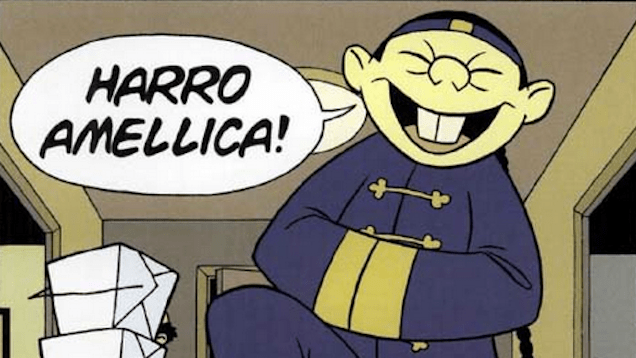
Comments
18 responses to “The Realest Comic About Growing Up Asian American And Hating Yourself”
Man, that’s deep. Are kids still little racist assholes? Surely not as much as the 80’s and 90’s since every 5th kid in Aussie schools nowadays isn’t white. Right? Or am I living under a rock?
My daughter came home from daycare last year and said “White people do this” and made ‘slitty’ eyes with her fingers.
She was three when she told us about this, she’s half Chinese.
That sucks man. My kids are going to be half Chinese too. I can only hope if I raise them to be open minded and not judge people based on appearance/beliefs, that others won’t do the same to them. Be the change you want to see in the world, right?
Oh yeah, kids will always be terrible people. They will always find one thing off about someone and pick on them, unless that person is part of the group. If you sit a group of kids in a room and make sure only one kid is wearing a hat, there’s a chance they’ll torment the kid for the hat.
I think that’s what the novel Lord of the Flies was about.
It seems basic human instinct is to hurt the people who are different. Animals do that too. I suppose what makes us better than animals is that we are taught morals and can make a conscious decision not to judge. But it’s in our basic instinct.
At my school, no Asians get bullied or tormented anymore than white kids. I go to a private school tho
Kids are a lot more tolerant these days, probably because adults are a lot more tolerant and kids don’t get taught that poking fun at different-looking people is acceptable. I think racism is slowly dying out as different races interbreeding lead to fewer ‘bastions’ of homogeneity. Even small country towns these days are seeing people of different ethnicities living amongst the whites. It’s fantastic to see kids learning to value and learn about different cultures.
removed
I can relate sadly.
As a Maori raised by a white mother, there was a period just before high school where things changed, kids became more aware of nationality and I became….weird to many.
(Long arse flash back follows)
It wasn’t too bad to begin with, but when I started high school many Maori students were placed in their own classes which offered more in depth cultural subjects. Those classes were open to anyone, it wasn’t meant as a form of segregation, it was meant as a way to ensure that Maori students still had access to our culture, but in many ways it certainly created segregation unintentionally.I actually thought on my first day that I would be placed in the “Multicultural classes” We all sat in an assembly while names were read out and those students were shuffled off with their home room teachers.
It was slightly scary and confusing to see all the Maori students being separated first and I actually thought my name was going to be read out any second, it was a little much for someone already struggling with their identity.
Once the MC groups had been taken away they began putting students in the “normal” classes and my name was called for the 1st accelerated class, this shocked me even more. (I really didn’t think I was in the top %’s of test results)
As we lined up and were taken away to our class, people actually stared at me with confused looks, the teacher even came up and asked my name to double check I was where I was supposed to be.
In the class itself people asked me if I was Maori and when I confirmed it they asked why I was there, the best I could do was laugh it off and say I didn’t know.
As time progressed some people accused me of cheating in my exams or said I was just there as a token MC student, no matter how well I did.
One major difference between the experiences here is I didn’t have anyone to relate to. I was too dark to be accepted by many white students and too “white” in my speech and mannerisms to be accepted by the MC students.
I’m not saying everyone thought this way, there were plenty on both sides who simply didn’t play in to that way of thinking and it helped a great deal.
I obviously ended up with the stereotypical “outcasts” Ended up singing in a metal band which threw even more people but by then I was getting past my identity issues, I was just me.
Even now I still cop a few unintentional stereotypes but I can easily laugh them off. When I met a new girlfriends parents I could actually see their relief, I mean their daughter had told them her new boyfriend was a Maori with a beard and tattoos, they imagined an 8 foot tall biker built like a brick shit house. (I’m 5’11 and lanky as shit)
Every now and then when a customer rep comes to vist they would come up and ask for me and looked surprised when I introduced myself.
“I thought you were..uh, what I mean is, I’m not saying, oh god” I would just chuckle as they fell over themselves and just shake it off and tell them it was fine, I know what they thought and that they didn’t mean anything bad by it.
My fav example like that was a lovely female rep I dealt with over the phone a lot, she walked in and started guessing who we all were. Without even breathing she reeled off names to faces and wasn’t doing that bad at all until she pointed at me and said “Well you have to be Ghayda” (The Muslim girl in our office) Everyone’s eyes opened wide and looked at me, but I just grinned and kept watching.
She looked to Mike, our handsome blue eyed and blonde haired sales rep. “You must be Matt” she cooed, flicking her hair and offering a handshake. Poor Mike sheepishly pointed at me and I waved with wide smile.
She went as white as a sheet and began stumbling over her words, it was a riot.
Jeez, that sort of thing from a teacher is pretty awful. I can’t say I’ve ever had much in the way of similar experiences but I always had massive amounts of respect and sympathy for an openly gay aboriginal friend in high school; he copped so much for things that were integral to his identity and he really struggled with that for a long time.
Sounds like you’ve dealt with it really well, I know I wouldn’t have done so any where near as well as you have or my friend has; this sort of thing is pretty disgusting and universal unfortunately.
I can only imagine how hard things were for your friend. Shit, even I can admit I took my issues out on a gay kid in my high school a few times, I was certainly no angel despite my own experiences and didn’t always handle things well.
The fact I turned on somebody else just to fit in wasn’t lost on me, even then.
I’m glad he had a friend like you though, I know my friends played a big part in helping me and even though I can remember the bad times, the good times with pals will always stand at the front of my memories.
Growing up in Australia in the late 90s and early naught’s in an Public School in Sydney, I’d say most people are pretty tolerant. Of course you get the few that are just plain dicks…
That more interesting thing are adults. Now that I’m in the workplace, very few Adults regard me as Australian (despite spending the last 20 years here with an undeniable Aussie accent…) and very few Asians regard me as Asian (because I have a preference to use english first instead of Chinese) and I lack the “Asian Pride” mentality…
“So where are you from?”
“Penrith”
“Yeah, but where are you from originally?”
“…….Penrith”
It’s funny seeing a melting pot at work. There are a lot of Asian kids who hang around exclusively with other Asian kids, and then there are Asian kids that hang around with non-Asian kids as well. I’m guessing that moving to adulthood there will be a difference between those that grew up in Australia with only Asian friends, those who grew up in Australia with non-Asian friends, and those who didn’t grow up in Australia. From my experience, the non-Australian Asians generally hang out with other non-Australian Asians and tend to speak their native language amongst themselves, but the Australian Asians vary from speaking their parents’ native language (if parents were non-Australian Asians) to other native speakers, to not at all – speaking English either from choice or from necessity (they only understand but don’t speak their parents’ native language). I guess it’s all about ‘fitting in’ when you get down to it. Some people feel like having a social circle consisting entirely of people who look and speak like them is more comfortable, while others feel a bit uncomfortable doing that.
You are a God.
Whoof. This hits pretty close to home. As a Chinese-Australian, I experienced a fair amount of this growing up, although thankfully the bullying wasn’t severe enough for me to develop any severe self-loathing. I sympathise, and I really hope we’ve moved forward in the last 15 years somewhat.
I was the second chinese boy in my year at a public school in Darwin in the late 80s. I experienced the casual racism we see everywhere today but this was not my experience at all. Kids didn’t treat me differently or mention my race all that often, it was easily as much as the Swedish kid, the American kid or the philippino kid and even most who were australian acknowledged their international roots. The NT is not the most progressive place on the world, either – heavily racist against indigenous australians, which i witnessed often but I never remeber anyone being so preoccupied with identity back then, the need to define ourselves as a sum of physical traits. I was a chinese kid but no one knew me as that, i’d just be the guy whose house they’d ride past when they wanted to play. Kids loved my mum’s fried rice and that was it.
Since our discussion on identity has intensified, you can easily see students’ gears’ turning and attempting to identify people around them. It’s a sort of consideration that’s worthwhile but i wonder if there isn’t a better way to teach this that doesn’t encourage kids to start drawing lines of difference in their heads. I’d say that kids are far more “vigilant” today about those not respecting everyone but it does at times very clearly lead the students to start splitting and taking sides as opposed to bridging gaps and solving problems. It feels like a new approach to the issue is required, one that takes into account the almost inherent perspective kids have of “identity” today that we didn’t have en mass years ago.
Holy shit.
At the article, at the comments.